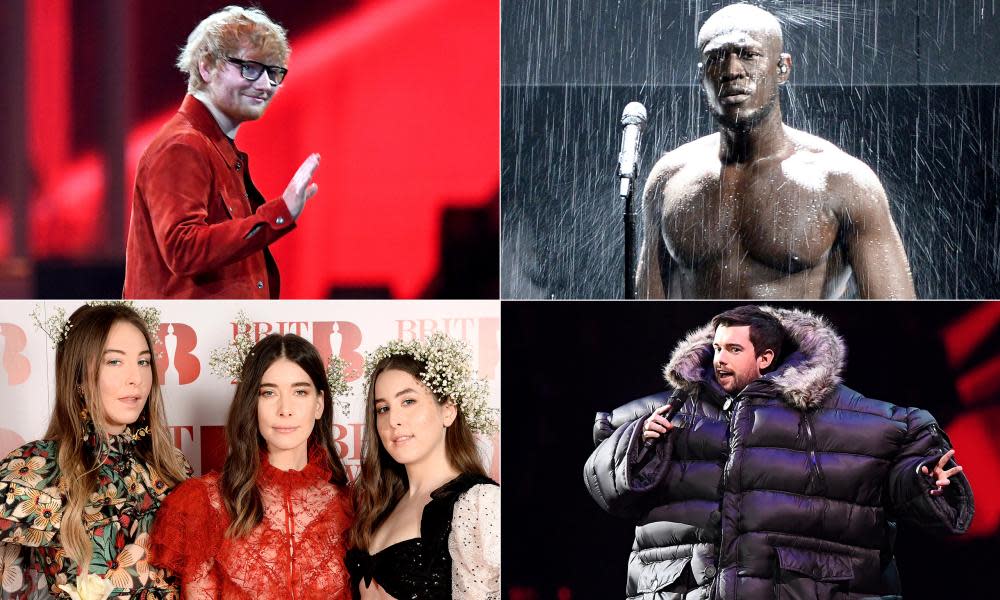Brit awards 2018: five things we learned, from Haim's humour to Stormzy's power

Este Haim was truly the year’s biggest winner
Este Haim stole the 2018 Brit awards, miming lip-balm application and the words “call me” while winking like Arrested Development’s Lucille Bluth during Jack Whitehall’s interview with Liam Payne and Cheryl Cole. (Runners up: her sisters Danielle and Alana corpsing in the background.) Alas, for all the tweets, few people on Twitter actually seemed to know who she was – perhaps because she wasn’t holding her instrument, the one that identifies her as Bass Face. But their admiring comments were brilliant nonetheless. “‘Drunk woman’ behind Liam and Cheryl at BRIT Awards makes viewers p*ss themselves laughing,” tweeted Lad Bible. Este retweeted it, adding: “Not drunk, just living my truth”. LS
Highly enjoying the person sitting behind Cheryl and Liam mouthing the words "CALL ME." #BRITs2018 pic.twitter.com/zVqhIq7cml
— Scott Bryan (@scottygb) February 21, 2018
And Ed Sheeran was the night’s biggest loser
Despite having the biggest album of 2017 by every metric imaginable, Ed Sheeran went all but ignored by last month’s Grammy awards, winning two minor, un-televised gongs (pop vocal album and pop solo performance). With four nods at this year’s Brits – plus the guaranteed global success award (AKA the “please come, we need you for coverage in tomorrow’s Bizarre column” bribe) – it was assumed that they would attempt to right the Grammys’ snub by lavishing recognition on a homegrown talent. Nope! He didn’t win a single one. None of which will make a difference to his colossal sales, of course, but when a massive-selling artist lacks critical acclaim, they can usually count on industry approval, and in this instance, Sheeran has neither, which has to sting. (Or maybe not: he and fiancee Cherry Seaborn are rumoured to have married in secret – they were both wearing wedding bands at the event – which is much more important than some ephemeral gong.) LS
Jack Whitehall should get the job next year, and the year after that
The presenter’s job has been monopolised by James Corden in recent years; though as a song-and-dance man he could be amusing, his luvvieish tendencies could make the Brits feel like the self-indulgence that it of course is. But Whitehall – an airy posho whose buffoonishness deflates him to everyman level – had fun with the event’s pretensions. Unafraid to lampoon Little Mix, draw out sexy, watershed-straddling banter from Cheryl and Liam and make himself an idiot in a Man’s Not Hot sketch, he aced his maiden year. The highlight was, after sensitively allowing Gorillaz’ guest stars their time in the limelight, an immaculate pricking of Damon Albarn’s meandering, vague attempt at statesman status: “I think he’s talking about Brexit,” deadpanned a sotto voce Whitehall. BBT

Politicised red carpets are getting old fast
The Brits spent weeks working out how to acknowledge the entertainment industry’s stands against sexual harassment and inequality, and, after all that, decided to copy the Grammys by asking attendees to wear a white rose on the red carpet. Fine: most guests did so (from the ITV coverage, Foo Fighters seemed to be the only high-profile act who didn’t), but that was about the extent of the tribute. Prior to the event, Brits chairman Jason Iley told me that they hadn’t planned any performances or speeches pertaining to #MeToo or #TimesUp, preferring to leave musicians to speak for themselves should they want to.
Accepting the award for British female solo artist, Dua Lipa said she wanted to see more women on the Brits’ stage, Ellie Goulding made an oblique reference to the Grammys’s lack of female winners, and Emma Willis cracked a brief jibe about the lack of a female co-presenter – all of them more significant than the red-carpet rose-wearing. The Brits organisers’ silent, near-apolitical embrace of that protest seems like an attempt to cover their own backs against criticism rather than, you know, actually make a key point about the inappropriate behaviour that affects the music industry just as much as Hollywood. LS
Stormzy beat Kendrick to the night’s masterstroke
Kendrick Lamar, a man who tends to let his lyrics and performances do the talking rather than interviews or public statements, created an artful, elliptical tableaux that elevated rap to a kind of performance art. He delivered his verse from pop-rap viral hit New Freezer atop a glass cube in which the track’s lead artist, Rich the Kid, silently smashed up a Lamborghini. This was announced as a “satire”, presumably on the acquisitiveness of rap culture; its eerie energy – cheerleader dancers out front, Beckettian theatre-making out back – was like little the Brits has ever seen before.
But Stormzy eclipsed its high-cultural aspirations with a freestyle that took the opposite tack. He spoke plainly and brutally about his dismay at the country’s media and political elite, and then – taking a single breath – suddenly modulated his voice into a keener, throatier register as he turned his back on negativity, championing the success of other black Britons. Rarely has black British creativity had such a vociferous affirmation in such a public place. It was reminiscent of Lenny Henry’s barnstorming speech at the 2015 Mobo awards where he reeled off a litany of great predecessors from Desmond Dekker to Moira Stewart – but was more focused, and crucially, beamed into millions more homes. BBT

 Yahoo News
Yahoo News 
